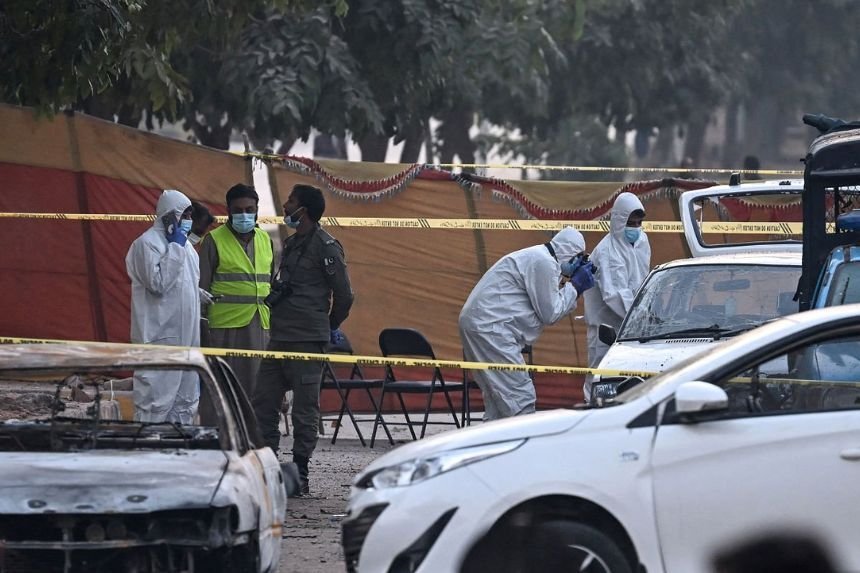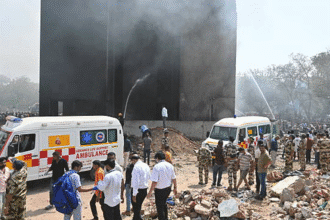Suicide bombings in South Asia have again highlighted the vulnerability of urban centers in the region. Within 24 hours, two major attacks shook New Delhi and Islamabad, leaving dozens dead and many injured.
- Islamabad Attack Highlights Suicide Bombings in South Asia
- Delhi Blast Adds to Regional Suicide Bombings in South Asia
- Political Responses to Suicide Bombings in South Asia
- Cross-Border Tensions Fuel Suicide Bombings in South Asia
- Impact on Civilians and Urban Security
- Historical Context of Suicide Bombings in South Asia
- Role of Militant Groups in Suicide Bombings in South Asia
- Economic and Diplomatic Implications
- Looking Ahead: Combating Suicide Bombings in South Asia
- Conclusion: Rising Threats Demand Regional Cooperation
- FAQs:
In Islamabad, a suicide blast outside the district court killed twelve people and wounded twenty-seven. The Pakistan Taliban (TTP) claimed responsibility, while the splinter group Jamaat-ul-Ahrar (JuA) released conflicting statements.
Meanwhile, in New Delhi, a car explosion near the Red Fort killed thirteen people and injured more than twenty. These attacks indicate a worrying trend: urban capitals, once thought secure, are now within the reach of militant networks.
The attacks have heightened tensions between India, Pakistan, and Afghanistan, threatening regional stability and escalating fears of further incidents.
Islamabad Attack Highlights Suicide Bombings in South Asia
The Blast and Immediate Chaos
The Islamabad attack occurred outside the district court during a busy midday period. Lawyers, litigants, and staff were present, and the suicide bomber tried to enter the courthouse. When the attempt failed, he detonated explosives near a police vehicle, causing widespread destruction.
Eyewitnesses described chaos, with injured people screaming for help and vehicles set on fire. Emergency services rushed to evacuate the wounded, while authorities cordoned off the area.
Officials confirmed twelve deaths and twenty-seven injuries. The Interior Minister Mohsin Naqvi verified the bomber’s identity through CCTV footage and noted that the blast left a severed head, confirming the suicidal nature of the attack.
Understanding the Pakistan IMF Bailout Controversy
Militant Groups and Responsibility
The Jamaat-ul-Ahrar (JuA) claimed responsibility, framing the attack as retaliation against Pakistan’s legal system. The TTP, however, distanced itself. This demonstrates the fragmented nature of militant networks in Pakistan and raises questions about their evolving operational reach.
Experts warn that JuA’s ability to strike Islamabad signifies a shift from smaller attacks in remote areas to high-profile urban operations, indicating greater threats to public safety.
Delhi Blast Adds to Regional Suicide Bombings in South Asia
The Attack and Aftermath
Less than a day after the Islamabad attack, a car explosion near New Delhi’s Red Fort killed thirteen people and injured over twenty. The explosion struck a crowded area with tourists, street vendors, and commuters, spreading panic and chaos.
Prime Minister Narendra Modi visited LNJP Hospital to meet the injured, assuring the public that authorities would pursue justice. The blast raised urgent questions about urban security and preparedness in India’s capital.
Investigation and Intelligence
The National Investigation Agency (NIA) is leading the probe into the incident. Police clarified reports about the vehicle being parked at Al-Falah University for days were inaccurate. Authorities are investigating potential links to broader networks.
Analysts note that targeting urban centers reflects a change in militant strategy. Capitals like Delhi, previously considered secure, are increasingly susceptible to attacks.
Political Responses to Suicide Bombings in South Asia
Pakistan’s Perspective
In Islamabad, Defense Minister Khawaja Asif declared that the country is in a “state of war.” He highlighted rising attacks by the TTP along the Afghanistan-Pakistan border and in Khyber Pakhtunkhwa, warning that these threats are now reaching the capital.
Prime Minister Shehbaz Sharif condemned the attack and assured citizens that those responsible would be apprehended. Security measures were reinforced in government buildings, courts, and diplomatic zones.
India’s Perspective
In New Delhi, opposition leaders questioned the government’s preparedness. Sandeep Dikshit urged authorities to investigate intelligence lapses and enhance preventive measures.
Prime Minister Modi emphasized India’s commitment to public safety and assured that those responsible would face justice. Analysts caution that political rhetoric can increase tensions between India and Pakistan, potentially escalating regional instability.
Cross-Border Tensions Fuel Suicide Bombings in South Asia
India-Pakistan Relations
Pakistan blamed “Indian-backed proxies” for the Islamabad blast. India dismissed the allegations, continuing a cycle of blame that follows regional terrorist attacks. Experts warn that such accusations could trigger retaliatory measures and escalate tensions.
Afghanistan’s Role
Pakistan has repeatedly accused Afghanistan of harboring and supporting the TTP. Afghan authorities, including the Taliban, have denied these claims and condemned the attack. Despite multiple rounds of ceasefire talks in Qatar and Istanbul, no permanent resolution has been reached.
Analysts, including Imtiaz Gul, highlight that as long as Pakistan views attacks as emanating from Afghan territory, chances of de-escalation remain slim, raising the likelihood of further incidents. Visit our homepage for more information.
Impact on Civilians and Urban Security
Casualties and Public Fear
Civilians were the primary victims of both attacks. In Islamabad, lawyers and staff were killed outside the courthouse, while in Delhi, commuters and residents were caught in the explosion. The attacks disrupted daily life, sowed fear, and eroded public confidence in security measures.
Government Response
Authorities responded by tightening urban security, increasing checkpoints, and enhancing surveillance. Travel advisories issued by the US and UK highlighted the ongoing threat. The attacks show that even heavily secured capitals are vulnerable to suicide bombings in South Asia.
Historical Context of Suicide Bombings in South Asia
Past Major Attacks
Militant groups like the TTP and JuA have orchestrated some of the deadliest attacks in the region. The 2014 Peshawar school massacre remains one of the most devastating attacks in Pakistan, while militant assaults in Kashmir have frequently targeted civilians and security forces.
Shift to Urban Targets
Recent incidents show a strategic shift toward urban centers. Crowded streets, judicial institutions, and tourist hubs are now prime targets. This evolution amplifies casualties and psychological impact, showing that suicide bombings in South Asia now threaten major metropolitan areas as well as rural regions.
Role of Militant Groups in Suicide Bombings in South Asia
TTP and Jamaat-ul-Ahrar
TTP maintains strongholds in border regions, while JuA focuses on urban strikes. Both exploit gaps in security and political ambiguities, using these conditions to plan attacks.
Strategic Implications
Experts like Michael Kugelman warn that the groups benefit from cross-border mistrust between India and Pakistan. Allegations of state-sponsored terrorism on both sides perpetuate cycles of violence, making coordinated counterterrorism efforts more difficult.
Economic and Diplomatic Implications
Trade Disruptions
The attacks disrupted cross-border trade, with Afghan Deputy PM Abdul Ghani Baradar advising traders to seek alternative routes due to security risks in Pakistan. The disruptions have regional economic consequences, affecting commerce and logistics.
International Mediation
Turkish officials, led by President Erdogan, are engaging with Pakistan to facilitate a permanent ceasefire with Afghanistan. The attacks illustrate that suicide bombings in South Asia have consequences beyond casualties, affecting diplomacy, regional stability, and economic activity.
Looking Ahead: Combating Suicide Bombings in South Asia
Recommended Strategies
Experts recommend enhanced intelligence sharing between India, Pakistan, and Afghanistan. Urban security can be strengthened through checkpoints, surveillance, and emergency drills. Sustained diplomatic engagement, community awareness, and counter-radicalization initiatives are critical to prevent future attacks.
Importance of Regional Collaboration
The twin attacks show that urban capitals are increasingly vulnerable. Coordinated regional measures are necessary to protect civilians, prevent militant activity, and maintain stability across South Asia.
Conclusion: Rising Threats Demand Regional Cooperation
The Islamabad and Delhi attacks reaffirm that suicide bombings in South Asia are evolving threats targeting urban centers. Vulnerable cities, cross-border tensions, and fragmented militant networks increase the risk of further attacks.
Mitigating these threats requires strategic vigilance, robust urban security, regional collaboration, and proactive counterterrorism measures. Only by working together can South Asian nations reduce the impact of suicide bombings in South Asia and safeguard the region’s citizens, infrastructure, and political stability.
15 Killed in Bomb Blast Near Political Rally in Pakistan
FAQs:
- What are suicide bombings in South Asia?
Suicide bombings are attacks where militants detonate explosives on themselves or vehicles, targeting civilians, security forces, or government institutions to create terror and instability. - Which groups are responsible for suicide bombings in South Asia?
Groups like the Pakistan Taliban (TTP) and Jamaat-ul-Ahrar (JuA) are often behind these attacks, targeting both rural areas and increasingly urban centers. - Why are urban areas targeted in South Asia?
Cities are targeted for their political, economic, and symbolic significance, maximizing casualties and media attention. - How do suicide bombings affect regional security?
They escalate tensions between countries, complicate diplomacy, and risk cross-border military responses. - What measures are governments taking to prevent these attacks?
Authorities use enhanced surveillance, checkpoints, intelligence sharing, and counter-radicalization programs to prevent attacks.








